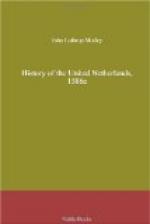The issue was encouraging, even, if the voyage—as a mercantile speculation—proved not so brilliant as the previous enterprises of Sir Francis had been. He returned in the midsummer of 1586, having captured and brandschatzed St. Domingo and Carthagena; and burned St. Augustine. “A fearful man to the King of Spain is Sir Francis Drake,” said Lord Burghley. Nevertheless, the Queen and the Lord-Treasurer—as we have shown by the secret conferences at Greenwich—had, notwithstanding these successes, expressed a more earnest desire for peace than ever.
A simple, sea-faring Englishman, with half-a-dozen miserable little vessels, had carried terror, into the Spanish possessions all over the earth: but even then the great Queen had not learned to rely on the valour of her volunteers against her most formidable enemy.
Drake was, however, bent on another enterprise. The preparations for Philip’s great fleet had been going steadily forward in Lisbon, Cadiz, and other ports of Spain and Portugal, and, despite assurances to the contrary, there was a growing belief that England was to be invaded. To destroy those ships before the monarch’s face, would be, indeed, to “singe his beard.” But whose arm was daring enough for such a stroke? Whose but that of the Devonshire skipper who had already accomplished so much?
And so Sir Francis, “a man true to his word, merciful to those under him, and hating nothing so much as idleness,” had come to the Netherlands to talk over his project with the States-General, and with the Dutch merchants and sea-captains. His visit was not unfruitful. As a body the assembly did nothing; but they recommended that in every maritime city of Holland and Zeeland one or two ships should be got ready, to participate in all the future enterprises of Sir Francis and his comrades.
The martial spirit of volunteer sailors, and the keen instinct of mercantile speculation, were relied upon—exactly as in England— to furnish men, ships, and money, for these daring and profitable adventures. The foundation of a still more intimate connection between England and Holland was laid, and thenceforth Dutchmen and Englishmen fought side by side, on land and sea, wherever a blow was to be struck in the cause of human freedom against despotic Spain.
The famous Babington conspiracy, discovered by Walsingham’s “travail and cost,” had come to convince the Queen and her counsellors—if further proof were not superfluous—that her throne and life were both incompatible with Philip’s deep designs, and that to keep that monarch out of the Netherlands, was as vital to her as to keep him out of England. “She is forced by this discovery to countenance the cause by all outward means she may,” said Walsingham, “for it appeareth unto her most plain, that unless she had entered into the action, she had been utterly undone, and that if she do not prosecute the same she cannot continue.” The Secretary had sent Leicester information at an early day of the great secret, begging his friend to “make the letter a heretic after be had read the same,” and expressing the opinion that “the matter, if well handled, would break the neck of all dangerous practices during her Majesty’s reign.”




